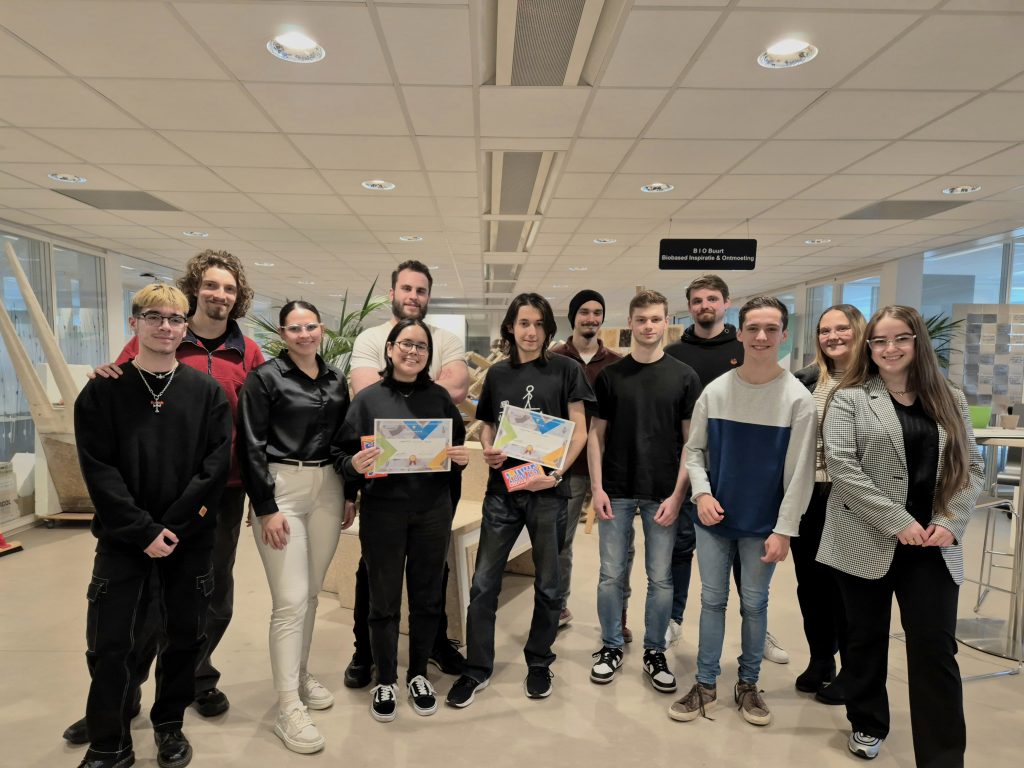
In March, the 2nd edition of the four-day Biobased Battle took place. 142 students from 7 different universities of applied sciences from the Netherlands and Finland collaborated in multidisciplinary teams to tackle sustainability issues faced by companies. The goal? To present the best practical biobased solutions!
The Biobased Battle 2024 was organized by Avans/MNEXT, HAN, HZ, Karelia, LAB, OAMK, and TAMK. Participating students worked in teams on one of the sustainability challenges. This also included the team of Dirk-Jaap Willemsen, a student at HAN: “Our team collaborated on the challenge of reducing hospital waste. What surprised me the most was the difference in perspectives among our team members on this topic. Some of us work in healthcare, and we discovered some differences in practices between Finland and the Netherlands. For instance, we found out that Dutch hospitals often have an in-house laundry department, whereas it’s common in Finland to enlist an external company.”
Winning ideas
After four days of battling, the teams came up with innovative ideas for the challenges. A panel of experts, consisting of lecturers, entrepreneurs, and teachers from the various universities of applied sciences, evaluated the ideas. Students from the winning teams share insights into the concepts that led them to victory.
Challenge 1: Biochar
Winners: Yoran Deering, Lassi Forma, Elina Karppinen, Marek Rokicki, and Robert Verkerk
Lassi Forma, a student at TAMK in Finland: “Our idea is to cover manure lagoons on farms with biochar. Biochar captures nutrients and greenhouse gases from the manure and can then be used as fertilizer. Biochar remains in the soil where it’s used as fertilizer, thus improving its quality for a long time. There are so many positive aspects to this solution! You’re sequestering carbon from the atmosphere and bringing it into the soil, making the soil healthier while combating carbon levels in the atmosphere. You reduce nutrient runoff, decrease eutrophication, and make nutrient use more circular. The smell of manure and greenhouse gas emissions are also reduced. We chose this because it’s a comprehensive solution to many problems.”
Challenge 2: Reduction of hospital waste
Winners: Svetlin Kalchev, Outi Valkonen, Javinah Werne, Dirk-Jaap Willemsen, and Heidi Yliharju
Svetlin Kalchev, a student at Avans: “The MCA analysis concluded that preventing the improper use of gloves is the most appropriate solution. The logical consequence is that by reducing the use of gloves in hospitals, fewer gloves are discarded, and fewer emissions occur from the production of new gloves or the treatment of glove waste.” He is proud of the way his team won the challenge. “The proudest (and most confusing) moment was when I found out that our idea won, despite being the most simplistic one. It made me proud because not overcomplicating things, as I usually do, paid off.”
Challenge 3: Connecting Fibers
Winners: Md Iram Sami Bhuiyan, Elina Halone, Jenni Jäminki, and Ngan Le
Md Iram Sami, a student at TAMK: “The topic was about the use of adhesives in EV batteries. This topic is broad and open to speculation, so I wanted to work on something unique. Initially, we thought about the furniture and wood industry, but later we decided to explore something completely different. We brainstormed about current global challenges, and the development of EV cars came to mind. From there, we discovered that batteries use adhesive, and the rest is history.”
